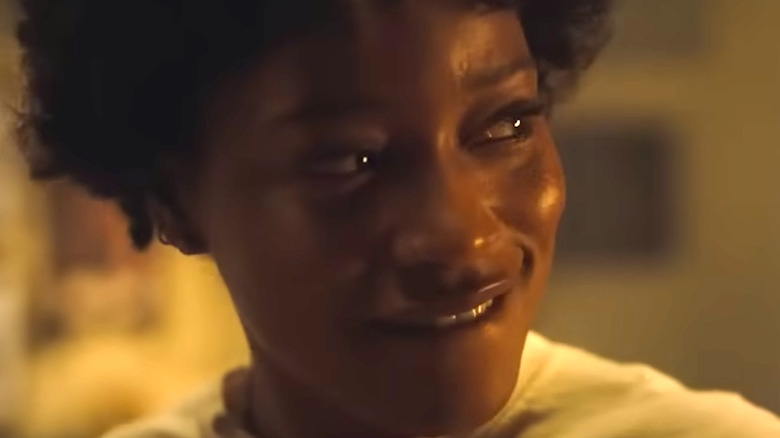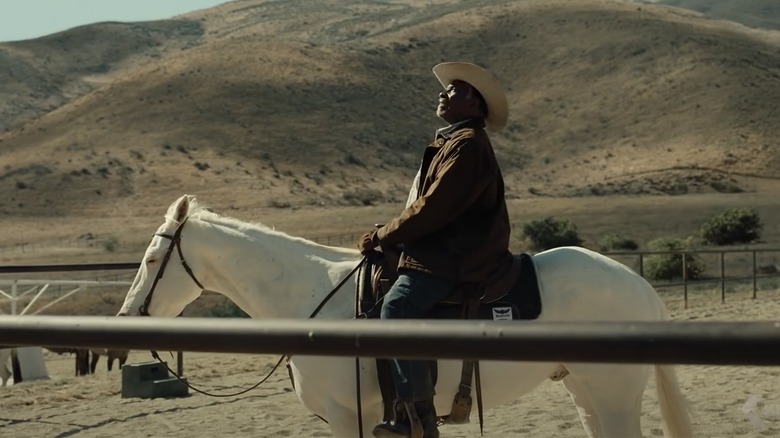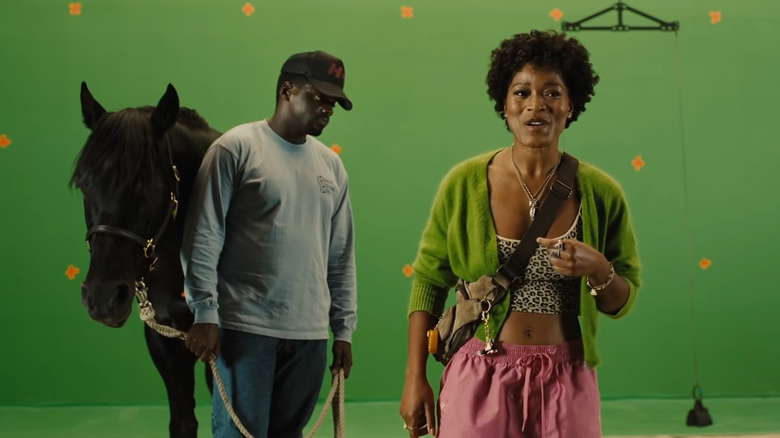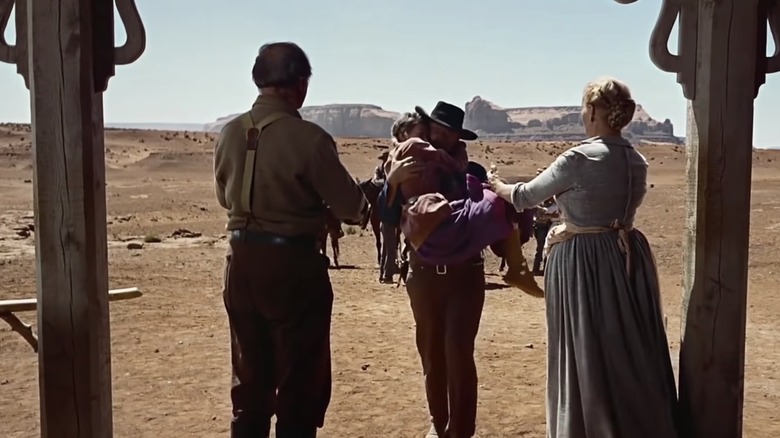What You Didn't Know About The History Of Hollywood's Black Cowboys In Nope
In the movie "Nope," OJ ( Daniel Kaluuya) and Emerald Haywood (Keke Palmer) run the ranch Haywood's Hollywood Horses. They start to encounter a faceless monster and strange events that turn their world upside-down as "Nope" transforms into a tale that's part horror, part Western, and part sci-fi, with some comedy thrown in ... and, of course, that subversion of expectations, courtesy of writer-director Jordan Peele ("Get Out," "Us").
Central to the summer tentpole's plot is the fact that their business is named for the Haywood's great-great-great grandfather, a jockey named Alistair E. Haywood, who rode a horse in the first moving picture ever made. That 1878 clip from Eadward Muybridge is an actual part of cinematic history, but as Vox pointed out, the passage of time blurs memory to the degree that names are lost and all that remains are the figures onscreen. To this end, the name of the Black man riding a horse in Muybridge's game-changing piece of footage is unknown to modern viewers. Through various elements, including visual references to Black Westerns like "Buck and the Preacher," Peele's third feature brings another historical erasure to light — that of the Black cowboys, who played a key role in America's history, especially during the period when our nation expanded westward.
While most movie-watchers today are more familiar with the Hollywood version of the Wild West featuring all-American heroes like John Wayne and Clint Eastwood, some scholars say on-screen representations of that era exclude people of color and specifically Black people (via The New York Times). Here's what you don't know about the history of Black cowboys.
One historian says one in four cowboys was Black
It only makes sense that, as historians like William Loren Katz have long said, one in four cowboys during the Westward Expansion era of the U.S. was Black (via Smithsonian). Americans who wanted land began moving into places like Texas in the early 19th century, bringing slaves with them to help them establish cotton farms and cattle ranches. Smithsonian magazine reports that by 1825, slaves made up 25% of the Texas state settler population, and by 1860, that number was more than 30%. These slaves learned the skills needed to tend ranches while their owners fought in the Civil War. When the war ended, they were hired as cowhands for their much-needed expertise. Other Black people fled from more settled places to try their luck on the frontier.
"Right after the Civil War, being a cowboy was one of the few jobs open to men of color who wanted to not serve as elevator operators or delivery boys or other similar occupations," Katz told Smithsonian magazine in February 2017. He noted these Black cowhands may have faced discrimination, but within their own crews, they were able to earn respect in a way other Black workers did not.
Katz, author of "The Black West," told The New York Times in September 2019 that Black people had the same roles as white people during that era. Some were town marshals, some were outlaws, and others were rodeo stars. Famous Black cowboys include Nat Love, Bill Pickett, Bose Ikard and Isom Dart.
There is a pattern of misrepresentation when it come to cowboys of color
It's entirely appropriate that the Haywards' ranch caters to the entertainment industry, which is a major source of modern-day misconceptions of the Wild West era. If you watch early Westerns, you won't see too many representations of Black people or of the many other people of color who helped build the nation in its early days — although stereotypic, violent, and often harmful representations of Native Americans are often included.
The Atlantic points out, in fact, that none of the first cowboys were non-Hispanic white (most were Spanish and Native American). And in addition to the high number of Black cowboys, one in three cowboys by the late 19th century was Mexican. Cowboy fashions, language, and technologies clearly draw from Latino culture. And, also in the west, around 15,000 to 20,000 Chinese immigrants were present, laying down Transatlantic Railroad tracks, paving the way for migration all the way to California.
"Whenever Westerns spring back into relevance, they resort to the same habits of misrepresentation. The result is that racial ignorance has been stratified, brick by brick, into the foundations of the genre on the groundless basis of 'historical accuracy," the publication notes.
Depictions of cowboys on movie screens have long been whitewashed
Some true-life Western heroes from pioneering days are Black, but they were whitewashed for movie audiences. Explorer Jim Beckwourth, for example, is featured in 1951's "Tomahawk," but his fictional counterpart was renamed and played by Jack Oakie, a white man (via Chicago Tribune). The story of Britt Johnson, a former slave who went after family members who were reportedly kidnapped by a Comanche raiding party, was represented in 1956's "The Searchers." But, as the Dallas Morning News pointed out, his character was played by John Wayne. Some believe the Lone Ranger was inspired by Black lawman Bass Reeves, the deputy U.S. marshal whose outsized reputation lives on (via Wide Open Country).
Eventually, Black cowboys did start showing up in feature films Some of the earliest and most memorable turns occurred in the 1960s and continue to the present day (think Danny Glover in "Silverado" or Morgan Freeman in "Unforgiven"), as IndieWire reminds us. However, these parts were subject to criticism for being token roles or simply historically inaccurate. In 1993, the Chicago Tribune shed a light on Beckwourth's original race but, while discussing "Posse," said the film was "too politically correct." Critic Roger Ebert put it this way: "The underlying story of 'Posse' is one that needs to be told, about an American West that was populated not just by white cowboys, but also by Blacks who rode the range, were lawmen and outlaws, and ruled themselves in their own black townships."
Things may be changing as a result of more recent movie trends. Preceding "Nope," there was Netflix's "The Harder They Fall," which focuses on Nat Love (Jonathan Majors). However, it remains to be seen if a new era focusing on Black cowboys has arrived.



